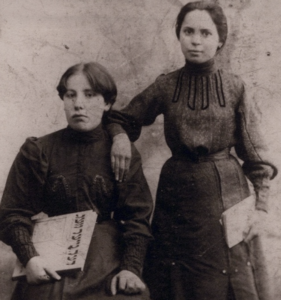False Messiahs
HISTORY, 29 Jan 2024
Barnett R. Rubin | Boston Review – TRANSCEND Media Service
How Zionism’s dreams of liberation became entangled with colonialism.
4 Jan 2024 – The picture above of two teenage Zionists was taken in 1906 in Kamenetz-Podolsk, Ukraine, in what was then the Russian empire. On the right is my wife’s, Susan Blum’s, paternal grandmother, Rose Resnick. On the left is a friend, name unknown, holding a Yiddish publication entitled Der Nayer Veg, or the New Way—the organ of the central committee of the Zionist Socialist Workers Party, founded in Odesa in 1905. It published twenty-five issues between May 1906 and January 1907, when it was closed by the Czarist authorities.
In the wake of Hamas’s October 7 attack in Israel, debates about Zionism and colonialism have exploded everywhere, from university campuses to the UN General Assembly. These girls, at least, were not settler colonialists; their Zionism was a response to the intensified persecution of the Jews in late nineteenth-century Europe. At the time about half of the world’s Jewish population lived under the rule of Russian Czars, and they were subjected to bloody pogroms. Rose recalled one in which the pogromists cut off the hands of a Jewish baker and tossed them in his oven so he could never again knead bread. My wife’s maternal grandmother, Pauline Unger, recalled the Odesa pogrom of 1905, the year before this photo was taken, when her neighbors saved her family’s lives by meeting the pogromists outside the building with a cross and swearing there were no Jews inside.
Der Nayer Veg was a product of the fervor that swept over the Jews of Russia after the 1903 Kishinev pogrom (some forty killed, hundreds raped) and the countrywide pogroms of October 1905 (several hundred killed), the latter following the failed Russian revolution of that year. In the wake of these waves of revolution and reaction, Jewish youth became increasingly radicalized. “To them,” writes historian Jonathan Frankel, “the revolution meant a struggle not only for social equality and political freedom, but also for national, for Jewish, liberation.”
This is the tradition that was transmitted to me and many American Jews my age about the origins of Zionism through education, folk memory, and artifacts like the photograph above. For many who grew up in this tradition, it is inconceivable that this ideology of liberation and self-determination could have anything in common with colonialism, any more than Rose and her friend did. In this light, the founding and repeated military victories of the State of Israel have formed an emotionally compelling historical narrative, echoing the praise of God in the Passover Haggadah: “He took us from slavery to freedom, from sorrow to joy, and from mourning to festivity, from deep darkness to great light and from bondage to redemption.” The Holocaust becomes in retrospect the “birth pangs” of the messiah—the pains and tribulations that the Jewish people will suffer before the ingathering of the exiles and their return to the Land of Israel, as foretold by the prophet Jeremiah: “it is a time of trouble unto Jacob, but out of it shall he be saved.”
This drama of Jewish history, however, was and remains embedded in world history, even if news of the latter was sometimes slow to reach Kamenetz-Podolsk. Zionists ultimately succeeded in transposing their efforts at self-liberation from Jewish into world history as no Jewish activists had done since the early Christians. But in the process, Zionism became something fundamentally different from the visions of Kamenetz-Podolsk.
TO CONTINUE READING PLEASE Go to Original – bostonreview.net
Tags: Colonialism, History, Israel, Israeli Apartheid, Middle East, Palestine, Zionism
DISCLAIMER: The statements, views and opinions expressed in pieces republished here are solely those of the authors and do not necessarily represent those of TMS. In accordance with title 17 U.S.C. section 107, this material is distributed without profit to those who have expressed a prior interest in receiving the included information for research and educational purposes. TMS has no affiliation whatsoever with the originator of this article nor is TMS endorsed or sponsored by the originator. “GO TO ORIGINAL” links are provided as a convenience to our readers and allow for verification of authenticity. However, as originating pages are often updated by their originating host sites, the versions posted may not match the versions our readers view when clicking the “GO TO ORIGINAL” links. This site contains copyrighted material the use of which has not always been specifically authorized by the copyright owner. We are making such material available in our efforts to advance understanding of environmental, political, human rights, economic, democracy, scientific, and social justice issues, etc. We believe this constitutes a ‘fair use’ of any such copyrighted material as provided for in section 107 of the US Copyright Law. In accordance with Title 17 U.S.C. Section 107, the material on this site is distributed without profit to those who have expressed a prior interest in receiving the included information for research and educational purposes. For more information go to: http://www.law.cornell.edu/uscode/17/107.shtml. If you wish to use copyrighted material from this site for purposes of your own that go beyond ‘fair use’, you must obtain permission from the copyright owner.
